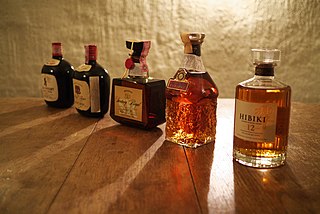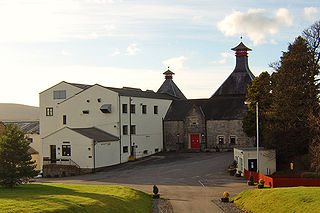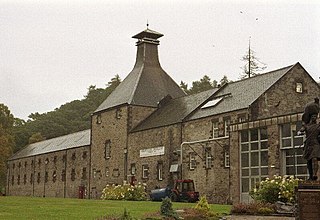
Scotch whisky, often simply called whisky or Scotch, is malt whisky or grain whisky made in Scotland.

Whisky or whiskey is a type of liquor made from fermented grain mash. Various grains are used for different varieties, including barley, corn, rye, and wheat. Whisky is typically aged in wooden casks, which are typically made of charred white oak. Uncharred white oak casks previously used for the aging of port, rum or sherry are also sometimes used.

Single malt Scotch refers to single malt whisky made in Scotland. To qualify for this category, a whisky must have been distilled at a single distillery using a pot still distillation process and made from a mash of malted barley. Therefore, a single malt means that the whisky has not been blended elsewhere with whisky from other distilleries. As with any Scotch whisky, a single malt Scotch must be distilled in Scotland and matured in oak casks in Scotland for at least three years, although most single malts are matured longer.

Glenmorangie distillery is a distillery in Tain, Ross-shire, Scotland, that produces single malt Scotch whisky.

Springbank distillery is a family-owned single malt whisky distillery on the Kintyre Peninsula in western Scotland.

Japanese whisky is a style of whisky developed and produced in Japan. Whisky production in Japan began around 1870, but the first commercial production was in 1923 upon the opening of the country's first distillery, Yamazaki. Broadly speaking, the style of Japanese whisky is more similar to that of Scotch whisky than other major styles of whisky.

Cardhu distillery is a Speyside distillery near Archiestown, Moray, Scotland, founded in 1824 by whisky smuggler John Cumming and his wife Helen. The distillery is now run by Diageo and the distillery's Scotch whisky makes up an important part of the Johnnie Walker blended whiskies. The word "Cardhu" derives from the Scottish Gaelic Carn Dubh, meaning "Black Rock".

Aberfeldy distillery is a single malt Scotch whisky distillery in Scotland.

As of 2006 most distilled spirits labelled as "whisky" in India were a form of Indian-made foreign liquor, commonly blends based on neutral spirits that are distilled from fermented molasses with only a small portion consisting of traditional malt whisky, usually about 10 to 12 percent. Outside India, such a drink would more likely be labelled a rum. According to the Scotch Whisky Association's 2013 annual report, unlike in the European Union (EU), "there is no compulsory definition of whisky in India, and the Indian voluntary standard does not require whisky to be distilled from cereals or to be matured. Very little Indian 'whisky' qualifies as whisky in the EU owing to the use of molasses or neutral alcohol, limited maturation and the use of flavourings. Such spirits are, of course, considerably cheaper to produce than genuine whisky." Such molasses-based blends made up 90 percent of the spirits consumed as "whisky" in India in 2004, although whisky wholly distilled from malt and other grains, was also manufactured and sold. By 2004 shortages of wheat had been overcome and India was one of the largest producers. Amrut, the first single malt whisky produced in India, was launched in Glasgow, Scotland in 2004. After expanding in Europe it was launched in India in 2010.

Glencadam distillery is a distillery in Brechin, Angus, Scotland that produces single malt Scotch whisky. The distillery is owned by Angus Dundee plc and produces one malt whisky, with the remainder of production sold to blenders or used within Angus Dundee plc for use in blended whisky brands.

Tomintoul distillery is a distillery in Kirkmichael, between Ballindalloch and Tomintoul in the Speyside region of Scotland, producing malt whisky for blends and bottled as single malts.
Douglas Laing & Co is an independent bottler of Scotch whisky. Based in Glasgow, Scotland and established in 1948, the company has a number of brands including its "Remarkable Regional Malts" range, encompassing The Epicurean, Timorous Beastie, Scallywag, Rock Island and Big Peat, as well as Old Particular, Provenance and Xtra Old Particular, which they collectively call their "Exceptional Single Casks". The firm also creates and sells King of Scots Blended Scotch Whisky, Clan Denny Single Casks and Premier Barrel.
Royal Challenge, commonly referred to by the abbreviation RC, is a brand of Indian whisky, manufactured by United Spirits Ltd (USL), a subsidiary of Diageo. It was launched in the early 1980s. According to Binod K. Maitin, a United Breweries technician who oversees all the liquor blends for the company, Royal Challenge is a grain flavored whisky, blended with Scotch malts and Indian malts. In an article for The Wall Street Journal, reporter Eric Felton states that, "About 12% of the blend comes from real malt whiskies: some of it made in India, some actual Scotch. The rest of the mix is a neutral spirit distilled from molasses. That means that, strictly speaking, Royal Challenge, like most Indian "whisky", is actually a rum flavored to pass as whisky." The manufacturer has refused to state the percentage of Scotch whisky used in the blend. In the United States, Royal Challenge is referred to as "spirit whisky". Besides India, Royal Challenge is sold in several other countries including the Middle East and the United States.

Amrut is a brand of Indian single malt whisky, manufactured by Amrut Distilleries. It is the first single malt whisky to be made in India. Amrut (अमृत) or amrit is a Sanskrit word which can be translated as "nectar of the gods", "nectar of life", or "drink of the gods". The company translates it as "Elixir of Life". The brand became famous after whisky connoisseur Jim Murray gave it a rating of 82 out of 100 in 2005 and 2010. In 2010 Murray named Amrut Fusion single malt whisky as the third best in the world. John Hansell, editor of American magazine Whisky Advocate, wrote that "India's Amrut distillery changed the way many think of Indian whisky – that it was, in the past, just cheap Scotch whisky blended with who knows what and sold as Indian whisky. Amrut is making whisky, and it's very good".

Paul John Whisky is a brand of Indian single malt and single cask whisky, manufactured by John Distilleries. The brand launched in London, England on 4 October 2012. Paul John Whisky is made from Indian 6-row malted barley and, for some variants, imported Islay and Aberdeen peat, distilled in traditional copper pot stills and then matured in charred American Oak casks at the company's distillery in Goa, India.
John Distilleries Pvt Ltd is an Indian company that produces distilled beverages, and the company's flagship brand is Original Choice whisky. It also manufactures brandy, whisky, wines, and the award winning single malt whisky called Paul John. The founders have sold 51% of the company to Sazerac Company.

Black Dog is a brand of blended Scotch whisky produced by the Indian beverage company United Spirits Limited (USL), a subsidiary of Diageo.
United Spirits Limited, abbreviated to USL, is an Indian alcoholic beverages company, and the world's second-largest spirits company by volume. It is a subsidiary of Diageo, and headquartered at UB Tower in Bangalore, Karnataka. USL exports its products to over 37 countries.
Radico Khaitan Ltd. (RKL), formerly Rampur Distillery & Chemical Company Ltd., is an Indian company that manufactures industrial alcohol, Indian Made Foreign Liquor (IMFL), country liquor and fertilizers. It is the fourth largest Indian liquor company. Radico brands are sold in more than 85 countries, including USA, Canada, South America, Africa, Europe, South East Asia, Australia, New Zealand and the Middle East.














